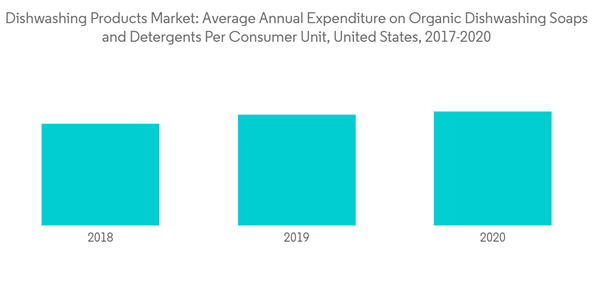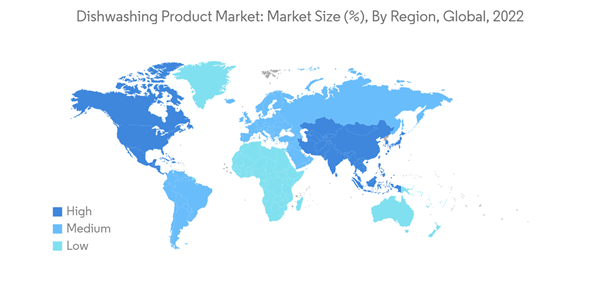The COVID-19 pandemic had a significant impact on the global dishwashing products market and considerably challenged and changed consumer behavior. The increased consciousness of health and hygiene among the global population resulting in the high demand for home care products including dishwashing products act as a driving factor for the market growth.
In the medium term, the global market is anticipated to record high demand for organic dishwashing detergents and liquids segments owing to the increased awareness about the harmful chemicals used in conventional dishwashing products. Moreover, key brands are marketing their products with attractive labels such as 100% natural and chemical-free formulations and dermatologically tested to target eco-conscious consumers. For instance, in December 2021, Unilever launched a new plant-based hand dishwashing product named Lux that's three times more renewable and 99% biodegradable.
The dishwashing products sale is dominated by offline channels, as household and kitchen cleaning goods are widely available in supermarkets/hypermarkets and convenience stores around the globe. Organized retailing is allowing the reach of private label as well as branded dishwashing products to the larger customer base across small cities and rural areas. Further, supermarket/hypermarket chains facilitate bulk purchase discounts for different brands of dishwashing products and offer a variety of products available in different sizes and packaging. In addition, the rising preference for online grocery purchases along with the rising number of e-grocery stores is likely to drive future growth in the global dishwashing products market.
Dishwashing Products Market Trends
Increasing Demand for Dish wash Liquids
Rising consumer interest in convenient homecare products, especially among the urban population is driving the demand for dishwashing liquids in the worldwide market. Being liquid form, it is easy to use, requires less water, creates a rich lather, and contains mild ingredients than conventional dishwash detergents. Moreover, the rising consumer inclination toward chemical-free and organic products is influencing key brands to launch herbal or natural dishwashing liquids free from harmful chemicals like phosphates and carbonates. Manufacturers are focused on formulating dermatologically tested dishwashing liquids to protect against skin irritation & allergies which sets them apart from other alternatives. For instance, in partnership with biotechnology company Evonik, Unilever has launched a 100% renewable and 100% biodegradable ingredient called Rhamnolipid, a type of surfactant found in nature that works in cleaning surfaces. The outcome product 'Quix dishwashing liquid' gives the same foaming and dirt removal qualities by naturally occurring process as the petrochemical-based products. Additionally, promotional strategies, digital advertisements, and the use of prints media by market players are likely to attract a large number of consumers to liquid dishwashing products.Asia-Pacific is the Fastest Growing Region
The dishwashing products market in Asia-Pacific is experiencing rapid expansion with the increasing number of households accompanied by urbanization. Nowadays consumers are highly aware of home hygiene and increasingly investing in well-equipped kitchens. Furthermore, urban households with high disposable income are using advanced home appliances such as dishwashers to manage busy lifestyles. Apart from urban settings perception of the rural population is also evolving towards home cleanliness and sanitation with the various government initiatives that promote hygiene practices among citizens. For instance, the Swachh Bharat Mission launched by the Prime Minister of India has significantly improved rural Indian's behavior in the area of household and personal hygiene. Furthermore, the number of brands in this region is offering quality products at a reasonable price and focus on offering a diversified range of dishwashing soaps, liquids, and detergents in attractive packaging formats and with different claims such as 99% germ protection, organic, and safe to sensitive skin. For instance, in May 2022, Finish, Taiwan's dishwasher detergent brand launched a new product under the Quantum series on its newly launched Taiwan website in 50-count packages.Dishwashing Products Industry Overview
The global dishwashing products market is highly fragmented owing to the presence of multiple regional and multinational companies offering a wide range of dishwashing products. Some of the prominent players in the market are The Proctor and Gamble Company, Unilever Plc, Henkel AG & Co. KGaA, and Reckitt Benckiser Group, among others. Industry participants are focused on product innovations, environment-friendly packaging, and improved distribution networks across online and offline channels to reach a larger customer base. For instance, in 2022, The Henkel company launched a new dishwashing liquid range called Pril Stark & Naturlich, featuring natural ingredients and sustainable packaging. Pril is offering a refillable pump dispenser, the bottle body is made exclusively from recycled plastic and the refill pouch saves 70 percent plastic compared to the pump dispenser. The formula contains 93 percent of ingredients of natural origin as well as food-certified colorants and fragrances.Additional Benefits:
- The market estimate (ME) sheet in Excel format
- 3 months of analyst support
This product will be delivered within 2 business days.










